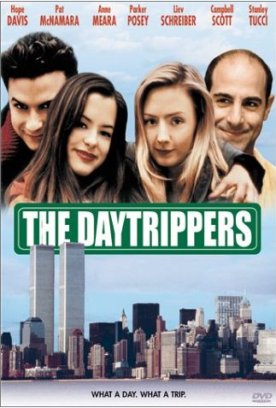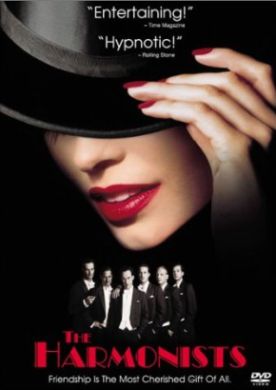Silver Linings Playbook
In order to like David O. Russell’s Silver Linings Playbook as it ought to be liked, it helps to see it as a movie about jealousy, even though that’s not quite the obvious way to see it. We learn in flashback that, when Patrick Solatano (Bradley Cooper) came home unexpectedly one day and found his wife, Nikki (Brea Bee), in the shower with another man, he beat the guy so severely that he had to be sent away to a mental hospital for eight months, as he was deemed to be suffering from “undiagnosed bipolar disorder.” The movie doesn’t make a big deal out of it, but it tells you something significant both about Pat’s subsequent history and about the state of our culture that the obvious cause of his behavior was seen as something to be ignored or rejected in order that it might be dignified, or made more socially and legally more acceptable, as a clinical condition — and that Pat himself accepts this medicalization of a moral matter as the only feasible way for him to make sense of his life.
The movie begins with his release from the hospital, in Baltimore, whence he is picked up and delivered back to his working class neighborhood in Philadelphia by his mother, played by the wonderful Jacki Weaver. Mom’s long practice in making the best of things it’s not easy to make the best of finds its echo in Pat’s now relentlessly upbeat belief in his own therapeutic successes. He is convinced that, having left his pathological jealousy behind him and having undertaken to read her recommended book-list (they are both high school teachers), he and Nikki can now get back together and be happier than ever. He has adopted the motto Excelsior! — Higher! — as his own. But he still suffers from bipolar episodes that become symptomatic of all that hasn’t changed about him, in spite of his desperate wish to believe it has — including his irrevocable estrangement from Nikki, who has taken out a restraining order against him.
Yet once his jealousy has been transmuted into a more socially acceptable form of mental illness, it becomes paradoxically easier for the therapeutic culture to see it not as an exotic but as a quotidian sort of madness — one among the many that love breeds in us and that we all have to learn to live with, with or without the coping mechanisms and the drugs Pat takes — or, mostly, rejects — for his. His court-mandated therapist, Dr. Cliff Patel (Anupam Kher), demonstrates the psychic hangover by playing Stevie Wonder’s “Ma Cherie Amour,” which Pat regards as his and Nikki’s song and which acts as a trigger to make him trash the doctor’s office, even though he is already apologizing as he does it. Later he throws Hemingway’s A Farewell to Arms through a closed window when he gets to the unhappy ending and feels personally betrayed. Later, he suffers acute anxiety and reacts violently when he is unable to find his wedding video in his parents’ house in the middle of the night.
The movie seems set to proceed on well-worn pathographical pathways but then doesn’t. Pat’s illness, if we want to stick with the iatrogenic metaphor, is gradually revealed to be not mental but spiritual. Like jealousy itself, of which it is a form, it is a sickness of the soul that only time and experience can cure. As we would expect from a movie, however, Pat is lucky to get into the fast lane to self-knowledge and acceptance as a result of his encounters with two other undiagnosed sufferers from psychic trauma who are trying to find the way to carry it with them and continue to function. One is his father, Pat Senior (Robert De Niro), a fanatical Philadelphia Eagles fan who has lost his job and is now trying to make his living as a bookmaker, though he dreams of opening a Philly cheese-steak restaurant. Part of Pat Senior’s wound has to do with guilt about his treatment of Pat Junior in the past, but this theme remains rather sketchy and undeveloped.
The more interesting encounter is naturally and crucially with an attractive young widow, Tiffany (Jennifer Lawrence), who has reacted to the accidental death of her husband, a police officer with whom she had had difficult sexual relations, by becoming sexually promiscuous. As much a human time-bomb as Pat is, she is characterized as “your loyal, married-to-a-dead-guy slut” — a phrase that well expresses the contradiction and the heartbreak in the idea of loyalty which all these characters are forced to confront. Even Pat Senior’s fanatical and more or less constantly disappointed loyalty to the Eagles comes to seem no more or less a form of everyday madness than Pat Junior’s hopeless loyalty to Nikki or Tiffany’s to her dead husband.
I think that the movie’s ambition somewhat outruns its achievement in a scene in which Pat Junior is once again drawn into a fight while tail-gating at an Eagles game. The moment helps him to form a new bond with his father, who has already been banned from the stadium for fighting, but the fact that the fight comes about as a result of racial aspersions cast against Dr Patel — himself a rabid Eagles fan — suggests a deeper meaning. Perhaps it is meant to highlight the primitive, tribal past of the virtue of loyalty as a way of suggesting reasons why people nowadays experience such ambivalent feelings about it and look to therapy as a way to cure themselves of what amounts to a permanent feature of the human condition. But, if so, this amounts to no more than a passing thought, lost amidst the comic and romantic psychic eruptions of Silver Linings Playbook.
The title also suggests the extent to which Mr Russell himself participates in his hero’s forced and desperate optimism. Clearly, he is aware of the problem of appearing too facile in offering, with the inevitable romance between Pat Junior and Tiffany, a way through and presumably out of their twin neuroses, but instead of downplaying the problem he rather highlights it by having them compete together in a dance contest in which victory will also mean that Pat Senior’s dream of selling cheese-steaks can come true. It is a postmodern-style flirtation with melodrama that can only be saved from its own cartoonishness by the visible connection the film is able to create between the two would-be lovers. If it is not so successful with this as one could wish, neither is it a failure. The unavoidable romance carries as much conviction as the idea of loyalty and its evil twin, jealousy, as a matter as much of letting go as it is of keeping hold of what we love.
Discover more from James Bowman
Subscribe to get the latest posts to your email.







